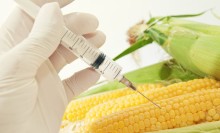Genetic Engineering
GMO Labeling: The Right to Choose

When it comes to food science, I often think of what food will be like in twenty, fifty or even a hundred years. I wonder about the quality of food available for my children, future grandchildren, and great-grandchildren. I question whether that food is going to be good for their health or not. And at the very least, if they will have the right to know what is in the food they consume.
40% Off Sale Celebrates New Non-GMO Logo On Oct 10th!
GMO stands for Genetically Modified Organism. GMO, also known as genetically engineered, bio-engineered, or biotech crop, is a term commonly used to refer to crops that have been genetically altered using gene-splicing technology (See the sidebar, "What Does GMO Mean, and Why Should I Be Concerned?).
GMOs: Risky Business
Food labeling laws have come a long way. For the benefit of the consumer, requiring identification of allergens and trans-fats is now mandated by the law. However, biotechnology, the process of genetic engineering that creates genetically modified organisms (GMOs), is a rapidly growing and potentially dangerous technology that has no labeling requirements. Today, many commercial crops are genetically engineered, with soybeans, corn, and canola at the top of the list. The only way to avoid them is to purchase products labeled “organic” or “Non-GMO.”
Ancient Rice in a Modern World: Biopiracy and Bioengineering
In the course of 8,000 years, innovative Asian farmers have bred over 10,000 varieties of rice, each suited to different growing conditions and tastes. Today, centuries-old practices of traditional rice cultivation are threatened by corporate financial interests and technologies known as "biopiracy" and "bioengineering."
Biopiracy
Knowing When to Say When
No, this is not an article about drinking and driving. It is about common sense and respect for nature. Big business has for years poisoned our food and water supplies with all sorts of chemical fertilizers and pesticides in the name of “progress.” It was really just a determined few who managed to preserve any meaning to the word “organic.”
Organic Food: Good for You and the Environment
When we think about consuming the freshest and healthiest food possible, it is important to consider two questions. One – what makes organic food natural? And the other – what impact do your shopping choices have on the environment?